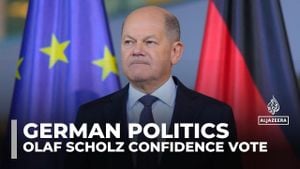Ukraine’s conflict with Russia is now seeing the unexpected involvement of North Korean soldiers, as recent reports indicate significant losses for these foreign troops deployed to bolster Russia’s offensive. On December 14 and 15, Ukraine claimed to have killed or injured at least 30 soldiers from the Democratic People's Republic of Korea during clashes near the Kursk region, which is under partial Ukrainian control.
According to Ukrainian intelligence, these losses occurred near the villages of Plyakhovo, Vorozhba, and Martinovka. The intelligence report, shared over Telegram, revealed, "On December 14 and 15, units of the People’s Army of Korea suffered significant losses... at least 30 soldiers were killed or wounded." This latest development emphasizes the rising tension and international involvement as the conflict continues to escalate.
Ukrainian President Volodymyr Zelensky remarked on the situation, noting, "The increasing involvement of North Korean soldiers marks a new escalation of the war." He characterized this as not just another chapter but as part of broader military strategies adopted by Russia to sustain its efforts against Ukraine, which has faced its share of challenging military confrontations since the conflict reignited.
Reports suggest North Korea may have dispatched over 10,000 soldiers to assist Russia, marking what appears to be their first large-scale mobilization. Zelensky called for global actions, expressing urgency by stating, "We need global action against this new escalation of the conflict." This plea not only highlights Ukraine's dire need for international support but also points to the importance of addressing unconventional military alliances formed amid the chaos of warfare.
The involvement of foreign troops raises numerous questions about the future of the conflict. Previous estimations indicated North Korean forces had already appeared on the battlefield since October; evidence of the military partnership between Moscow and Pyongyang could complicate the already fraught global geopolitical dynamics. Observers note how this may shift international responses toward resolving the conflict, potentially impacting peace negotiations and global regional security.
Despite the ambiguous statements from Russia about the presence of North Korean troops, the latest developments could trigger heightened diplomatic efforts among world powers. The historical backdrop of military engagement might inform potential allies of where assistance is most needed and how to create leverage against the evolution of the conflict.
Overall, the situation reflects the spiraling complexity of the Ukraine conflict, which, once limited to regional hostilities, now presents itself on the world stage with increased international military collaboration. The dynamic suggests not just localized battlegrounds but also an expanded theater for international actors, each with their stakes and interpretations of necessary actions.
With each day, more layers are added to the narrative of this enduring conflict, significantly driven by alliances with global ramifications. Ukraine’s current struggle reveals much about the modern face of warfare, where lines are blurred, and traditional responses to aggression do not always suffice. The nation’s intentions to hold their ground against both national and international forces resonate with resilience, drawing attention to both the humanitarian and political dimensions of the battle.



